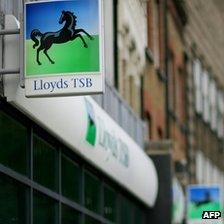Lloyds bigs up the Co-op
- Published
- comments

With 1,000 branches, 10% of all branches of UK banks, and 7% of the current account market, the enlarged Co-op should represent serious new competition to the giants of British banking.
And for the Co-op, it looks like an amazingly good deal. It is paying a maximum of £750m for 632 branches and for capital that Lloyds is bestowing on the business of £1.5bn - which means there will be a loss on the transaction of up to £750m for Lloyds.
What the Co-op will be getting is a very solid bank: £24bn of mortgages, matched to the tune of 98% by highly desirable retail deposits.
Lloyds is also underwriting the fundraising by the Co-op (the sale of perpetual subordinated debt, since you asked) to pay for the down payment of £400m. So, in effect, Lloyds is lending the Co-op the purchase price.
The Co-op's bank will operate off Lloyds' IT systems, and Lloyds is providing the senior management of the Co-op's enlarged bank.
It is hard to think of any deal in which the seller has provided quite so much help to the buyer. This transaction would be the equivalent of you selling me your house for half its value, in return for an IOU from me, whose value you would be guaranteeing - and you would be throwing in all the furniture and all your possessions (and much of your family) for nothing.
But Lloyds had no choice. It was forced by European regulators to make the divestment. And it felt there was no better deal on offer (and as a semi-nationalised bank, Lloyds' management took some comfort from the chancellor's enthusiasm for bigging up the Co-op)
There is one other thing that the Co-op is getting, and that is the TSB brand. For a few years, the branches being sold by Lloyds will be rebranded as TSB, which is one of the few banking names untainted by the financial and ethical disasters of recent times.
The idea of the rebranding is to deter 4.8 million Lloyds customers, who are being asked to transfer to the Co-op, not to leave in droves: an attempt will be made to reassure all of them that they would be leaving Lloyds for a bank, that if anything, is at least as strong as Lloyds (which may not be that hard, given all the financial, managerial and IT help that Lloyds is handing over).